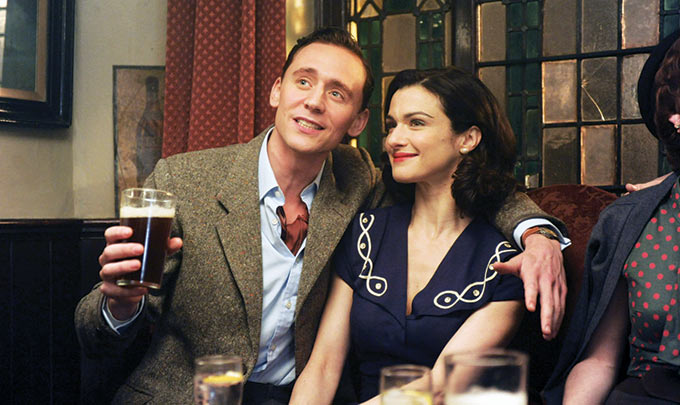The Deep Blue Sea
by George Sax

A Prisoner of Love
The Deep Blue Sea
Terence Rattigan’s 60-year-old drama, The Deep Blue Sea, might seem an unlikely source for a new movie about the destructive power of love, but another Terence, Terence Davies, is no ordinary filmmaker. He’s been exhibiting an elegist’s refining consideration of the play’s post-World War Two setting for some time. The era in which he grew up, the 1950s, has a hold on Davies’s imagination, as he’s shown in such self-referential movies as The Long Day Closes.
After Noël Coward, Rattigan was the most prominent English dramatist of the 1940s and much of the following decade. The socially circumscribed lives and repressed feelings he studied in his plays probably wouldn’t attract a lot of writer-directors in our post-Madonna, après Bill Clinton, hip-hop cadenced, and intrusively social-networked world, but Davies is more comfortable with the earlier era. He understands its lingering, if diminishing, standards of respectability.
Rattigan’s central character, Hestor Collyer (Rachel Weisz) has fled respectability for what may well seem even to her to be a sordid affair. She has left her husband, a knighted jurist, to live with her lover in a “bedsit” in a distinctively unfashionable district of London. Her illicit love object Freddie (Tom Hiddleston) was a very young RAF pilot during the war, and this harrowing but glorious service—as a surviving member of Churchill’s famous “so few”—was the apex of his life. “The excitement, the fear; nothing like it!” he exclaims at one point. Freddie hasn’t been able to find a secure, suitable place in peacetime. He’s chronically broke and unemployed, and drinks too much. His most obvious recent achievement was finding Hestor, but she has proven to be too much for him too.
Their affair would be ill-starred even in less socially and economically straitened circumstances. For Hestor, Freddie is almost everything. For him, not so much. This aging boy hero is probably constitutionally incapable of responding strongly to her intensely focused and compelling love, the first real love this woman, several years his senior, has experienced. Her marriage to Sir William Collyer (Simon Russell Beale) was almost loveless because it lacked passionate compulsion and mutuality of understanding. But Freddie can only respond to her desperate love with discomforted puzzlement, elusiveness, and, eventually, anger.
Like the play, Davies’s movie opens with Hestor’s despondent act, which will precipitate a drastic challenge to their relationship and lives. Davies has reordered the play, moving to and fro between the present and Hestor’s history with Freddie and William, taking much of the action out of Rattigan’s bedsit setting and one-day frame. Hestor’s plight has, if anything, been made more visceral. The movie has simplified the play’s events even as it has enlarged its scope, and it renders this trio’s situation slightly but noticeably more bleak.
Rattigan was a very important figure in England’s cultural firmament during his salad years, but he was also a sort of outlier, because, like Coward, he was a homosexual. This semi-secret fact of life has posthumously prompted some post-liberation speculative reinterpretation, some “discovery” of gay subtexts. This sort of exercise is all too tempting. Rattigan’s restricted persona must have shaped some of his work and his sympathies, but Hestor can just as easily be seen as a proto-feminist figure.
The playwright’s work may seem quaintly inconsequential to many today. It was pushed off stages in the late 1950s by the provocative, often loud theater of John Osborne and other Angry Young Men. Davies’s fluid, time-shifting, and contemplatively sad adaptation communicates the poignance and impact that Rattigan’s work can still convey. But at the same time, this picture has vitiated some of the play’s force, especially by casting Beale as William. Collyer is supposed to be a bourgeois authority figure, a commanding presence, who’s been perplexed and wounded by Hestor’s abandonment of him. Beale’s diffident but resentful portrayal, and his literal lack of stature beside Weisz, as well as the apparent gap in their ages—he’s only eight to 10 years older in the play—make this seem an unlikely match. A scene of Davies’s invention in which the couple visits Hestor’s mother-in-law and William acts mother-ridden, heightens this effect.
In the main, however, Davies and Rattigan have served each other well.
Watch the trailer for The Deep Blue Sea
|
Issue Navigation> Issue Index > v11n13 (Health & Wellness, week of Thursday, March 29) > Film Reviews > The Deep Blue Sea This Week's Issue • Artvoice Daily • Artvoice TV • Events Calendar • Classifieds |









 Current Issue
Current Issue